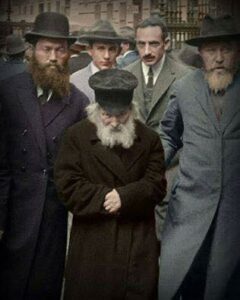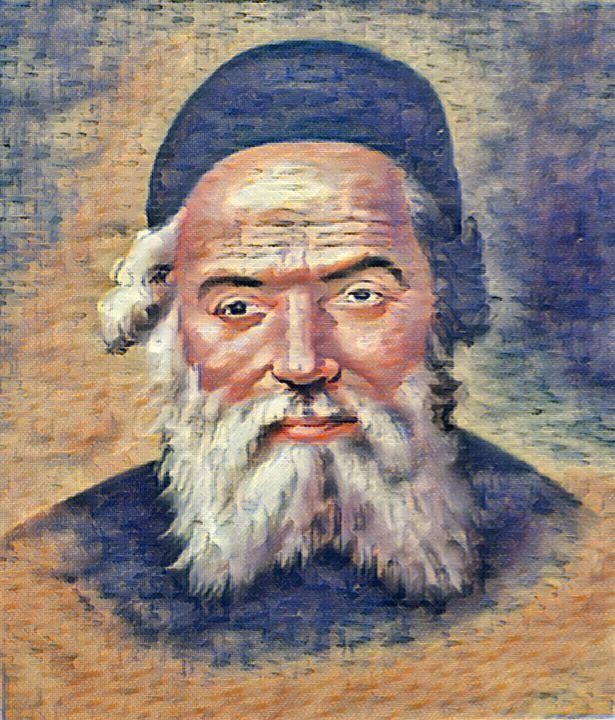The Chofetz Chaim on Aliyah
by HaRav Shamaiya Dichovsky
[People sometimes ask, “Is it a Mitzvah to live in Israel in a time of danger?” This question takes different forms. “Is it permissible to live in settlements in Israel where there is a clear danger, for example, Hevron.” Or, “If my parents or my Rabbi oppose my desire to live in Israel, do I have to listen to them?”
There are several principle Halachot that stand behind these questions. For example, is a Jew allowed to place himself into a dangerous situation in order to do a Mitzvah? Is it a Torah commandment to live in Israel? What is considered a danger? Does a person have to listen to his parents or his Rabbi if they try to prevent him from performing a mitzvah? Here, we will relate a story told about the Chofetz Chaim, which sheds light on the subject.
The Chofetz Chaim, Rabbi Yisrael Meir HaCohen, from Radin, was certainly one of the greatest Torah scholars of modern times. His unparalleled halachic work, the “Mishna Berura,” is the considered the definitive compendium of Jewish law. In addition, his writings on good deeds and kindness, “Ahavat Chesed,” and his treatises on the evils of Lashon Hara, the “Chofetz Chaim” and “Shmirat HaLashon,” show his great piety and saintliness. He is known never to have spoken unfairly about anyone. The following story is brought down by the revered Rabbi Shamaiya Dichovsky, of blessed memory, in his book, “Neot Desha,” on concluding a tractate of Talmud. In the introduction, he recounts his visit to the Chofetz Chaim in order to ask him this very same question about moving to Israel at a time of danger. We quote:]
“I saw it proper to record a statement made to me by the most pious of all of the Cohanim, the Rabbi of all Israel, the glory of the generation, the holy of all Israel, may he be blessed in memory, in the matter of Aliyah. I asked him about this question, and the following are the details of our encounter.
“It was the beginning of the year, 1933. There was a group of Torah scholars who had organized themselves to go together to Israel to learn Torah. I too was amongst them, but I had many doubts, because I knew that many of the great gedolim (Torah scholars) of Israel were opposed. The heads of my Yeshiva were especially opposed to the idea that Yeshiva students would go to Eretz Yisrael, even for the sake of studying Torah. They said that the proper conditions had not as yet been established in order to facilitate Torah study with the proper diligence in the Holy Land, to the extent that we are able to study Torah in the Yeshivot in the Diaspora. Therefore, I said in my heart, that I must not ask my rabbis in this matter, for obviously the answer will be no.
“Like Rabbi Zera, who ran away from his teacher, Rav Yehuda, when he wanted to make Aliyah to Israel (Tractate Ketubot, 110B,) I decided to go and ask the counsel of the righteous man of our generation, our revered rabbi, and to receive his blessing before I departed. Therefore, just before the Day of Atonement, I journeyed to the yeshiva of the Chofetz Chaim in the town of Radin, where I stayed in the shadow of this great, righteous individual. This was, as is known, the last Yom Kippur of this special Tzaddik, for at the end of the year, in the month of Elul, he was taken to the Yeshiva Above, may his merit be a shield to us and all Israel.
 “In spite of his great physical weakness, a Heavenly Providence was with me, and I merited to see him the day after Yom Kippur. I told him my situation, and that I had a good chance of making Aliyah to Israel as a Torah student, only I had lingering doubts if I would be able to learn Torah with the same diligence with which I was learning now. Immediately, he answered, in his famous sweetness of speech, that there was no room at all for my wariness. Why in the world would I not be able to learn Torah there with absolute diligence – just the opposite would seem to be true, for the Land of Israel, without question, was more conducive for steadfast immersion in Torah. He recited the verse, ‘The gold of the Land is good,’ (Bereshit, 2:12) on which the Midrash says, ‘These (the gold of the Land is good) are the words of Torah, for there is no Torah like the Torah of Eretz Yisrael; and there is no wisdom like the wisdom of Eretz Yisrael.’ (Bereshit Raba, 16:7)
“In spite of his great physical weakness, a Heavenly Providence was with me, and I merited to see him the day after Yom Kippur. I told him my situation, and that I had a good chance of making Aliyah to Israel as a Torah student, only I had lingering doubts if I would be able to learn Torah with the same diligence with which I was learning now. Immediately, he answered, in his famous sweetness of speech, that there was no room at all for my wariness. Why in the world would I not be able to learn Torah there with absolute diligence – just the opposite would seem to be true, for the Land of Israel, without question, was more conducive for steadfast immersion in Torah. He recited the verse, ‘The gold of the Land is good,’ (Bereshit, 2:12) on which the Midrash says, ‘These (the gold of the Land is good) are the words of Torah, for there is no Torah like the Torah of Eretz Yisrael; and there is no wisdom like the wisdom of Eretz Yisrael.’ (Bereshit Raba, 16:7)
“Before I could express the rest of the doubts that I harbored – especially the fear of the danger in Israel because of the children of Ishmael who were marauding violently against the Jews, for only a few years had passed since the end of the Hebron Massacre in the year 1929, which made clear to everyone the wild, bestial nature of the Ishmaelites, who with savagery and unbounded cruelty massacred Yeshiva students and showed no mercy even to the women and children – before I was able to confess all of my apprehensions, the Rabbi answered the question himself.
“In the following words of Torah, he said: ‘The holy Torah tells us regarding Ishmael that he is a ‘Pere Adam,’ a wild beast of a man. It is known that our Torah is eternal, and if it says about Ishmael that he is a wild beast of a man, then Ishmael will remain forever a wild beast of a man. Even if all of the cultured nations of the world will gather together and try to educate Ishmael and transform him into a cultured individual, so that he will no longer be a wild beast of a man, obviously this will be impossible in every fashion or form. They will not be able to do this through any means whatsoever, because he is not capable of being a cultured individual, for behold, the Torah testified regarding him that he is a wild beast of a man. This means that forever, for all eternity, Ishmael is by definition a wild beast of a man. Even if Ishmael will be involved in intellectual endeavor, like being a lawyer, or some similar profession, then he will be a beastly lawyer. If he will study diligently to be a professor, then he will be a beastly professor. This means that the bestiality of Ishmael will never cease.’
“Then the Chofetz Chaim let out a long, painful sigh and said, ‘Who knows what this wild beast of a man is capable of perpetrating against the Jewish people in the end of days?’
“Concluding his words to me, he said, ‘Nevertheless, fear not – there is no reason for this to prevent you from making Aliyah to the Land of Israel.’
“Then he blessed me, saying, ‘Go in peace, and the L-rd will bless your path.’
“So I left him, and journeyed in peace to the Holy Land.”






